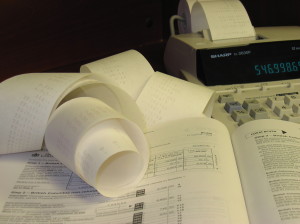Guidelines to tax audits and assessments in Italy (*)
Specific rules regulating the frequency of tax audits
The Italian law provides general guidelines about the frequency of the tax audits.
In principle, large companies (annual turnover > 25 €/mil) should be object of tax audit at least each two years, while other companies should be at least each four years but the actual application of those guidelines is presently far from being completed.
The Italian Tax Law also provides special Tax control procedures for those enterprises whose total turnover does not exceed €/ 7.5 (€/mil 5.16 up to fiscal year 2006).
These latter procedures are based on standardized (on statistic basis) economic models of the different business fields and are aimed at assessing whether or not a specific subject’s taxable income is in line with its own standard model.
The procedure is computer based. The software is provided and regularly updated by the Tax Authority and operates on data which refer to the economic situation of the taxpayer (location of the business, number of employees, ect.).
When a taxpayer’s taxable income is not in line with the standard model, the taxpayer comes to be subject to a higher possibility of undergoing a tax audit.
The ordinary tax assessment expiry terms
Tax assessment (for both Income taxes and VAT purposes) can be notified within 31 December of the fourth year following the filing of the Tax return. E.g.: Tax year 2013, filing of the Tax return in 2014, tax assessment expiry term at December 31, 2018.
How tax audits and tax assessments are carried out in Italy
Tax audits and tax assessments can be carried out either by a special branch of the Finance Police (Guardia di finanza) or by the inspectors of the Tax Office (Agenzia delle Entrate).
Tax Audit can take place at the taxpayer’s premises as well as in the Tax Authorities’ offices.
When the audit is carried out at the Tax Authorities’ offices, books, records, and any other documentation deemed necessary by the Tax Auditors to complete an audit have to be moved to the Tax Authorities’ offices.
In the course of the Audit performed at taxpayer’s business premises, Tax Auditors directly deal with the management of the company and they can ask to have access to any relevant information and documentation (book, records, invoices, letters, ect.).
The Statute of Limitations provides that the Tax Auditors can stay at tax payer’s premises for no longer than 60 working days (30 days ordinary term + 30 days extension).
At the end of this period, tax audit must come to an end unless extraordinary issues arise. Tax Auditors must take note of the observations and requests made by the taxpayer.
At the end of their audit, the Tax Auditors must draw up a Tax Audit Report, for the Local Tax Office, whereby the outcome of the audit activity must be detailed and the findings (if any) must be illustrated and motivated. A copy of the report has to be filed to the Tax Office.
It is worth pointing out that the Tax Audit Report is not an executive act against the taxpayers and that it does not bear any request for payment of higher taxes and/or penalties. It is indeed the Tax Assessment notice which brings forth such requests to the taxpayer.
The office receiving the Tax Audit Report examines the findings reported by the Tax Auditors and starts the assessment procedure (see below) which may lead to the issuing of a Tax Assessment Notice.
The Tax Assessment Notice can be issued and notified to the taxpayer only after the expiry of a 60-day term running from the notification of the Tax Audit Report. The said term is in favour of the taxpayer to file his comments and observations with the Tax Authorities. These latter are indeed required to take the taxpayers’ observations into consideration before issuing the Tax Assessment Notice.
The powers of Tax Authorities during a tax audit
In the course of tax audit, Tax Auditors can:
i. enter and search (with the taxpayer’s consent) the taxpayer’s premises. In case of denial of consent, the search can be carried out by the Tax Inspectors only on the basis of a written authorization by the competent Tax Office. A Public prosecutor’s order is necessary when the search is carried out in personal residences;
ii. convoke taxpayers on their legal representative in order to gather the relevant information related to the assessment;
iii. ask taxpayers to produce or submit any such documentation which is deemed relevant for the purpose of the audit. Tax Inspectors are entitled to hold the said original documentation in their Offices for a maximum period of 60 days from the day of receipt;
iv. send taxpayers questionnaires in order to gather information. The taxpayers is required to return the said questionnaires to the Tax Authorities filled in and duly signed;
v. require copies or abstract of documentation filed with Public Notary or any other functionary.
It is worth pointing out that the denial of producing the requested documentation or the explicit statement that documentation does not exist and/or cannot be retrieved by the taxpayers has the side effect that those same documents cannot be used anymore for the benefit of the taxpayer’ defence in case of litigation against the Tax Court.
Penalties expected in case of:
1) Failure to file a Tax return
Failure to file a Tax return implies a penalty ranging from 120% to 240% of the taxes due. Minimum penalties (ranging from € 258 to € 2,065) are applicable if no tax liability emerged.
2) Untrue Tax return
Untrue Tax return (be it in the form of Tax return showing either a taxable income lower than the one assessed or a tax credit higher than those owed to the taxpayer) implies a penalty ranging from 100% to 200% of the higher taxes ultimately due.
3) Failure to issue or register an invoice
Failure to issue or register an invoice implies the following penalties:
i. if the transaction is subject to VAT, a penalty ranging from 100% to 200% of the relevant VAT;
ii. if the transaction is not subject or exempt from VAT, a penalty ranging from 5% to 10% of the payment received. Yet, if the above transaction was duly taken into consideration for income tax purposes, only a penalty ranging from € 258 to € 2,065 is applicable.
4) Failure to effect a payment within the prescribed deadline
Omitted and/or late payments of taxes of whichever kind and nature imply a penalty equal to 30% of the unpaid/late paid tax. Interest are applicable as well (2.5% per year).
However under the special procedure to reduce penalties, called ravvedimento operoso, it is possible to avoid the application of ordinary penalty (30%) by paying a reduced penalty which ranges from 0.2% to 3.75%, depending on the length of the delay.
5) Non compliance with book-keeping obligations
In this case a penalty ranging from € 1,032 to € 7,746 is applied. Still, it is worth pointing out that in case of most serious non compliances that were proved to cause an obstruction to the tax audit itself (e.g.: impossibility of determining the turnover of the taxpayer under examination), the Tax Authorities are allowed to fully disacknowledge the entire accountancy held by the taxpayer and assess the taxable income on the basis of economic indicators and presumptions.
Actions to undertake after the company receives a Tax Audit Report or a Notice of Assessment and possibilities to achieve a settlement with the Tax Authorities
After receiving a Tax Audit Report, a company can file with Tax Authorities a descriptive memorial. The aim of such a deed is to challenge the remarks pointed out in the Tax Audit Report and, thus, trying to achieve the repeal of part or of all findings set forth in the Tax Audit Report before the very issuing of the Tax Notice of Assessment.
Alternatively, the company can settle the dispute by accepting the remarks in the Tax Audit Report without any challenging (Aquiescenza ai processi verbali di constatazione) and, by so doing, can benefit by the reduction of the penalties to 1/8 of the minimum. This settlement can be opted for within 30 days following the notification of the same tax audit report.
The above is a faculty for the taxpayer, who may indeed choose to simply wait for the issuing of the Tax Notice of Assessment. At that time the following options are made available to the taxpayer:
i. file an appeal before the Provincial Lax Court (Commissione tributaria Provinciale). The appeal must be filed within 60 days from receiving the Notice of Assessment;
ii. apply for a settlement with the Tax Authorities (Accertamento con adesione). Within 15 days from receiving the above instance, Tax Authorities should convoke the company. The procedure may lead to (i) the achievement of the Tax settlement; or (ii) the reject of the settlement proposal by the Tax Authorities or by the taxpayer. Please note that the penalties applied in case of a positive tax settlement are reduced down to ¼ of the minimum applicable amount. The whole tax settlement procedure cannot last more than 90 days. The expiry of this term corresponds to a rejection of the tax settlement proposal. It is worth pointing out that, if the tax settlement procedure is applied for, the 60-day term for appealing before the Provincial Tax Court is suspended. The said terms is reactivated if the settlement procedure is closed without positive result or, in any case, leave aside the settlement procedure and go for the appeal before the Court.
iii. accept the Notice of Assessment without any challenging (Aquiescenza), paying the higher taxes thereby assessed. In this case penalties are automatically reduced to ¼ of the amount levied.
The Italian Tax Courts jurisdiction structure
In Italy tax jurisdiction is exercised by (i) the Provincial Tax Court, which judges in the first degree of judgment and (ii) Regional Tax Court to which the taxpayer and/or the Tax Authorities are entitled to appeal against the adverse sentence of Provincial Tax Court.
The third and last degree of judgment is represented by the Supreme Court of Cassation. Appeals before the Supreme Court are allowed only for legitimacy issues related to the Court proceedings and the Tax assessment procedure.
Criminal penalties and transfer pricing
Please take into consideration that thresholds for criminal law implication have been recently lowered. They apply automatically:
• if the evaded tax is more than € 50,000 and
• if the total amount of revenue not being subjected to tax, even through the deduction of fictitious costs, is more than 10% of the declared revenue or is more than about € 2 mil.
However, criminal penalties may not be imposed if the unpaid amount has been assessed on the basis of erroneous evaluations and to the extent that the methods used to make these valuations have
been adequately described in the explanatory notes of the balance sheet.
* I testi e l’elaborazione dei testi, anche se curati con scrupolosa attenzione, non possono comportare specifiche responsabilità per involontari errori e inesattezze. / The contents of this article, even if treated with scrupulous attention, can not involve specific responsibility for inadvertent errors and inaccuracies.
1 Comment for this entry
-
This is a very good tip especially to those new to the blogosphere.
Short but very precise information… Thank you for sharing this one.A must read article!






free google adwords
September 24th, 2014 on 03:41 AM